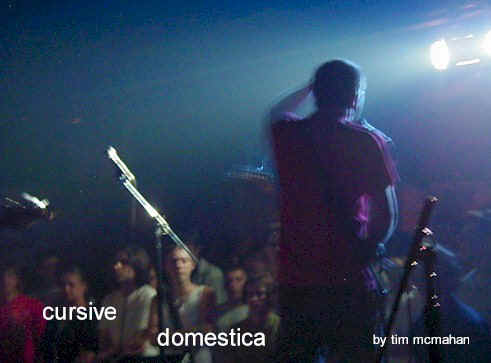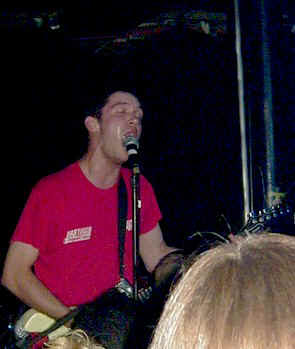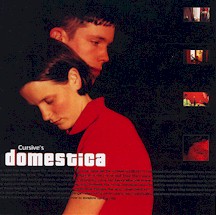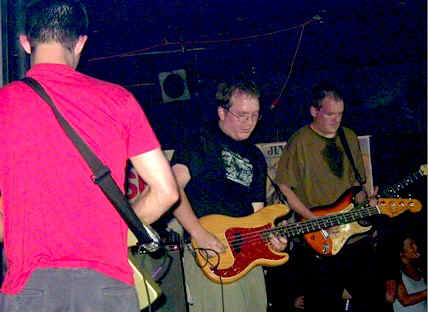|

Cursive's Domestica uncovers the
painful side of relationships gone bad, layer by rocking layer. How much of his life will
Tim Kasher reveal?
|
|
|
|
Imagine what
happens when Tim Kasher's next girlfriend is handed a copy of Cursive's Domestica
by a knowing friend and is told, "You better listen to this."
First, she'll glance at the sweet couple on the CD jacket and smile. It's so cute! But
the cuteness will quickly fade when she checks out the song titles: "The
Casualty," "The Martyr," "The Game of Who Needs Who the Worst,"
"The Night I Lost My Will to Fight." It's only after she hits the
"play" button and is pounded severely by the opening guitar assault that she
begins to see the whole picture. Kasher, his boyish sotto voice, almost whispers the
opening line: "The night has fallen down the staircase/And I for one have felt its
bruises."
Kasher might have some explaining to do. |
|
|
Rarely in
rock has the modern screwed-up relationship been presented in such forthright, gritty,
honest terms. Taken as a whole, Domestica, Cursive's new full-length CD on Saddle
Creek Records, is nothing less than an indie rock opus, a concept album that summarizes
the darker side of relationships gone awry.
In a bit of promotional hubris, Saddle Creek label honcho Robb Nansel -- with Kasher's
approval, of course -- put together a one-sheet (that's industry talk for a glorified
informational background paper) that succinctly eliminated any doubt of what Domestica
is all about.
"Tim Kasher, singer/songwriter for Cursive, got married," says the flyer,
which Nansel had printed as a sticker and slapped on the back of every copy of the CD sent
to the media. "With blue skies up ahead, the troubled days of guitar-driven rage
would surely become a branch of the past. But as his songs have always predicted, there
will be no happy endings…
"Tim Kasher, disillusioned and disappointed, got divorced. And though he'll swear
to you that Cursive's upcoming full-length, 'Cursive's Domestica' is not an autobiography,
the parallels are difficult to ignore."
The one-sheet goes on to describe the CD as "the vicious assault, the tender
embrace and the bitter waiting game that falls in between. These are stories of anger,
heartbreak, deceit and disappointment that keep us desperate." |

"As I wrote the CD I thought I kept a
distance. I knew I was writing about something I went through, but I also knew there were
a lot of fictions in it"
|

Kasher and company have produced a concept
album that conveys the intimate, personal and desperately painful feelings tied to a
marriage lost in mutual loathing.
|
Strong stuff.
Kasher says he still hasn't shown a copy of the CD to his ex-wife. "I need to talk to
her before she sees the sticker," he said. "She's only asked me what the title
was about. I'm going to explain it to her the same way I would explain it to anyone else.
The story will sound familiar, but she'll listen to it and realize that it's not our
life."
He explained all this while eating French fries in the dimly lit stock room of the USA
Baby store off 72nd and Dodge streets, Cursive's official rehearsal studio and where
Kasher works a day job. The rest of the band was late, which gave Kasher time to explain
the album's "concept" and why he put the sticker on the CD in the first place,
especially if he didn't entirely agree with the idea.
"I was looking at it as promotion," he said, sitting below a tower of brown
cardboard boxes. "I knew it would be important for the industry to understand the CD,
but it didn't occur to me that the press would pick up on it and talk about it."
He says the whole topic is difficult to discuss. "As I wrote the CD I thought I
kept a distance," he said. "I knew I was writing about something I went through,
but I also knew there were a lot of fictions in it. I didn't want to write a CD that I
wouldn’t enjoy performing. I really see the two characters in the CD -- Sweetie and
Pretty Baby -- as actors."
For example, on track 5, the bass-driven chimer "A Red So Deep," infidelity
is sort of implied with the lyrics, "Are you satisfied tonight, Oh trader's wife/Does
he neglect you?/Crawling barstools and Touching girls/As you wash their smell from his
clothes."
"Kim and I never had problems with cheating on each other," Kasher said.
"It's part of that fictitious relationship I wanted to write about. Some of their
problems weren't necessarily about us."
But what about that line "a hole where the phone was thrown"?
"That did happen," Kasher admits. "Some of it is based in reality, but
there really weren't very many lyrics to begin with, so I plugged in most of the story
line myself. At the end of the CD -- on the cold February night that kind of symbolizes
their last treacherous argument and he realized that he lost the will to fight -- none of
that is true. These characters don't get divorced, they continue living together because
that's what they've chosen. On the CD, the explosion isn't a breakup, it's an acceptance
that this is what domestic life is." |
|
|
Sound bleak?
It would be if the music didn't make you want to shake your ass. Don't tag it as emo --
this is way too tuneful for that. Every song has a guitar part that is either mesmerizing
or just plain bouncy. Kasher and company have produced a concept album that conveys the
intimate, personal and desperately painful feelings tied to a marriage lost in mutual
loathing.
Domestica is a leap forward from their last CD, The Storms of Early Summer,
whose cosmic lyrics took on the world's problems on a universal scale, with cryptic song
titles such as "A Career in Transcendence" and "When Summer's Over Will We
Dream of Spring."
"I actually spent more time on those lyrics then these," Kasher said.
"This one is more like storytelling. With Domestica, I always knew what I was
writing about."
But old-time Cursive fans will recognize much of their distinctive sound. The band
might be compared to the driving, indie rock of Jawbox, Fugazi or Burning Airlines, but
certainly no other band on the Saddle Creek label sounds anything like them. They've been
ordained the label's official heavy-rock band, and they've embraced that title with a
snarling grace.
"We're the only ones on Saddle Creek who really have an aggressive style,"
Kasher says. "One reason is because Conor (Oberst of Bright Eyes) and Todd (Baechle
of The Faint), knew we were already doing rock. It's part of the reason why The Faint went
electronic."
But regardless of their styles, there is an obvious continuity among the Saddle Creek
bands. Kasher points to the fact that most of the band members grew up together and share
the same attention to composition. More likely, though, is the connection between the
bands' bleak lyrics and musical subtext. Bright Eyes' songs are folky laments of
alienation and self-questioning. The Faint's Euro-electric-pop trip sports sterile lyrics
about sex without love. Lullaby for the Working Class perform barren, stripped-down
soundscapes that are as lonely as a Kansas prairie in the dead of winter. Cursive's
guitar-driven bursts of anger and confessional lyrics of frustration fit right in with the
discontented theme.
With a June 19 release date, Domestica already is receiving a ton of college
airplay, and it won't be long until it joins Bright Eyes' Fevers and Mirrors at the
top of the CMJ charts. At least that's the plan.
|

"We're the only ones on Saddle Creek who
really have an aggressive style,"
|

"I expected so much from the band
(Lullaby) and when it didn't happen, I felt disillusioned. Now it's all about honing
skills, working on songs and collaborating."
|
One by one
the band entered the pseudo practice space and set up. Around the stockroom's concrete
floor, the four plugged in amps, set up drums and tuned guitars, preparing to rock out
among stacked cartons of disposable diapers and plastic playthings. Someone threw a
glowing blue ball at guitarist/vocalist Ted Stevens' crotch that just missed. "This
is the part in the practice where we try to whack each other," he said, kicking the
ball at drummer Clint Schnase, who casually tapped it away and went back to mounting a
cymbal.
There's some dissension as to how the band will present Domestica on stage: As a
typical assortment of tunes mixed with older Cursive songs, or in the order they appear on
the CD, sort of like performing a rock opera. "I don't like to see bands recreate an
album on stage," says bassist/vocalist Matt Maginn. "I prefer diversity."
Kasher, on the other hand, likes the idea of using Domestica as a set piece.
"We'll play it straight through on Saturday (June 3, the night of their Omaha CD
release show). I think it's kind of cool that way."
At the show, they, in fact, did play most of Domestica, but definitely not as a
rock opera. The night's biggest burst of applause came at the end of the set, when they
played an old Slow Down Virginia tune that, according to Kasher, Stevens' demanded they
cover live before he agreed to join the band last year.
Stevens has his hands full these days not only playing in Cursive but as vocalist and
guitarist for Lullaby for the Working Class, a 7-piece acoustic band whose CDs are
released on Bar/None Records, while the vinyl versions are handled through Saddle Creek.
How is he going to split his time between the two bands? "I'm still waiting to see
what happens with that," he said. "I'll be fine as long as I have a guitar for
each project. I'm kind of a schizo. One of my many personalities is to be
non-committal."
Lullaby was the first of the Saddle Creek bands to garner real critical success. Their
second album, 1997's I Never Even Asked for Light, was a New York Times
critic's choice, and The Associated Press called it "an enchanting escape from
the monotony that often plagues both old and new country."
"My opinion is that the music industry has changed since the break in
Lullaby," Stevens said. "I expected so much from the band and when it didn't
happen, I felt disillusioned. Now it's all about honing skills, working on songs and
collaborating."
Pressed about his frustrations with Lullaby, Stevens said he's speaking solely of a
publishing deal that never came to fruition. "There was one in the works," he
said. "A publishing deal means immediate success; it means you have the luxury to
write and tour without having to worry about money. It's naïve to think any kind of deal
is in the bag. That situation has forced me to write better songs."
"I've been doing Cursive for four or five years," said Schnase from behind
his drum set. "I've been playing rock since I was 16. Whatever comes, comes. You
can't expect anything out of it."
Stevens agreed. "I'd love to be able to make a living writing songs. My goal is to
hopefully stay around long enough to be able to get a job at a record label and continue
to write." |
|
|
Despite past
disappointments, Stevens says he hasn't enjoyed writing and performing this much since
when he started out. "It seems like people are excited about playing music
again," he said. "I feel the same collective energy that was around when we were
just getting started."
For these guys, that dates back to the early '90s and a time when the Omaha/Lincoln
music scene was ripe with bands such as Sideshow, Mercy Rule, Mousetrap, Frontier Trust,
Ritual Device, Sideshow, not to mention the singer/songwriters such as Bill Hoover, Simon
Joyner and Alex McManus. "The whole Saddle Creek movement grew out of that era,"
Stevens said.
"I was heavily influenced by Pioneer Disaster, The Acorns and Mousetrap,"
adds Kasher. "I would go to Mercy Rule and Mousetrap shows and wonder if I could be
that old guy who was headlining. We have friends who moved here because they think there's
something romantic about this city. It almost makes you wonder who was the genius in the
'80s who started the local music scene. I'd sure like to thank him."
Back to 
Published in The Omaha Weekly June 8, 2000. Copyright © 2000 Tim
McMahan. All rights reserved. |
|
|

![]() webboard
interviews
webboard
interviews